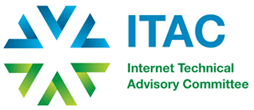On 21 June 2016 after the conclusion of the ITAC Forum in Cancun, Mexico, the following messages were published.
Key messages to the OECD Ministerial on the Digital Economy 20-23 June 2016, Cancun, Mexico
About the Internet technical community
- The Internet technical community is an indispensable stakeholder and significant contributor to the global Internet governance dialogue. The organizations and individuals in this community have had over four decades of cumulative experience in creating, improving, deploying, and managing the Internet in almost all countries of the world.
- We share a common culture that is grounded in a clear understanding of the unique technical characteristics of the Internet.These characteristics are essential to the Internet’s past, present, and future success as a platform for advancing the economic and social well-being of all of its users.
- The principles that have promoted and sustained the development of the Internetsince its inception — the open and inclusive process for developing Internet protocols and standards, the impartial stewardship of Internet naming and addressing resources, and the decentralized cooperation and collaboration of network operators around the globe — are the Internet technical community’s critical contribution to debates on Internet governance and the future of the Internet economy.
Policies for a trusted Internet
- The most successful Internet policies enhance and are built on the Internet’s unique properties such as information-sharing, global reach and secure communication, resilience and its ability to enable collaboration and innovation at the edges.
- Some government decisions about the Internet are coloured by fear, distrust and uncertainty. Cyber strategies that focus on reaching “absolute security” risk closing countries off from its greatest benefits; openness, innovation and growth.
- Participation in the global digital economy means global interdependence and trust. Though they might at first seem to be vulnerabilities, the global interdependence and trust the Internet is built on are its greatest strengths and the source of its economic and social benefits.
- Policy-makers (whether domestic, regional or global) face a choice between two different paths forward. One path leads to an open, trusted, multistakeholder Internet and all the social and economic benefits it brings, while the other path leads to an untrusted and increasingly fragmented network that fails to drive growth and remains vulnerable to threats from outside. One path leads to opportunity, the other to stagnation. The key is trust, and how to sustain the Internet as a fundamentally vibrant and trusted space.
- There will always be risks and downsides to an open network – malicious actors will find ways to exploit vulnerabilities; and technologies and capabilities we develop to improve one part of life may impact another. But threats can be mitigated, risks and information distributed, weaknesses shared and repaired. The network’s very openness contains the means to protect it.
Multistakeholder policy solutions
- The Internet evolved within and alongside a system of multistakeholder governance where those affected by decisions have the opportunity to be part of them.
- All stakeholders share a collective responsibility for the continued vitality of the Internet and the benefits it brings our societies and the global economy.
- Building and sustaining a trusted Internet means different types of players – with different roles and responsibilities – need to take action, closest to where the issues are occurring.
- The Internet’s governance reflects the Internet itself; open, distributed, interconnected and transnational. Just as the Internet is interoperable, so are its governing parts.
Key priorities for the future of the digital economy
- Expanding Connectivity: Access to the Internet offers unprecedented opportunities to bridge economic and social divides. However, more than half the world’s population is not yet online. To expand global connectivity, and to improve affordability and accessibility, it is crucially important to harness the full benefits of the Internet as a platform for the digital economy driven by innovations at its edges. The goal has to be a policy environment conducive to private sector investments and competitive markets, one that supports the global adoption of Internet Protocol version 6 (IPv6) in order to extend the Internet address space, as well as the development of local content, not least through the introduction of International Domain Names (IDNs) and Internet Exchange Points (IXPs).
- Preserving the Open Internet: Global interoperability and preservation of the Internet’s end-to-end principle, where each node in the network can reach all other nodes in the world through a free flow of information, must be protected to ensure its utility as a platform for connecting people, and thus for education, innovation, creativity and economic opportunity. The use of open standards and principles of permissionless innovation at the edges of the network must be protected to ensure the Internet’s continued development as a general-purpose technology to benefit all stakeholders. Neither government regulation nor economic monopolies should delay or prevent the continued development of the Internet trough anti-competitive behavior.
- Ensuring trusted technologies: The continued growth of the digital economy is dependent on users and businesses knowledge that security and other policy objectives do not hurt their privacy expectations, online identities and fundamental rights. This trust can only be ensured through collaborative solutions, and by making multistakeholder participation the norm in all aspects of the Internet’s governance. It requires a legal environment that obliges, but also enables companies to support users rights, as well as a strengthening of the users’ understanding of the importance of security, and the skills needed to protect themselves and other users. Fostering the adoption of security protocols and standards developed in a bottom-up process, such as the DNS Security standard (DNSSEC) is also necessary.
- Strengthening the skills of users and workers: The sustainable development of the digital economy can only be achieved through strengthening the required skills of users and workers. Digital literacy, and the inclusion of ICTs in education and trainings, must be the norm in formulating capacity building policies in the future economy characterized by cross-sectoral digitalization – including targeted efforts for women, youth, and persons with disabilities.
